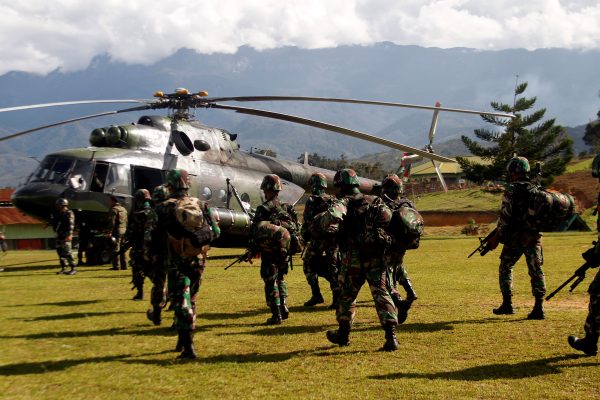Having an influential voice in this dynamic and rapidly changing policy field requires qualitative improvements to Indonesian peacekeeping policy, which will be difficult to achieve in the short run.
By the end of 2019, Indonesia aims to deploy 4000 military and police personnel in UN peacekeeping operations. And it would like to see the Indonesian Peacekeeping Training Center (PMPP) become a regional hub and recognised centre of excellence for peacekeeping training.
The ‘Vision 4,000 peacekeepers’ was first declared in 2012 by former president Susilo Bambang Yudhoyono, himself a former peacekeeper. The choice of 4000 reflected the aspiration to figure among the top 10 peacekeeping contributing countries in the world, which Indonesia has already achieved. As of January 2019, there are 2912 Indonesian blue berets serving in eight missions in Africa and the Middle East. This makes Indonesia the world’s eighth largest contributor to peacekeeping.
Indonesia is yet to register any units in the UN Peacekeeping Capabilities Readiness System, which serves to expedite the deployment of police and troops contingents. This may soon change, as the relevant domestic institutions work towards meeting the UN’s requirements for peacekeeping training, certification and equipment.
But whether Indonesia reaches the 4000 mark will mainly depend on demand. The UN mission in Darfur is already being scaled down and set to end in 2020, meaning that 325 Indonesian peacekeepers currently serving in Darfur will be repatriated. Besides a small political mission in Yemen, there are no further possibilities for deployment on the horizon.
Nor does quantity in personnel on the ground automatically turn a country into an influential actor in UN peacekeeping and a strong player on the Security Council. Indonesia needs to put greater effort behind developing qualitative goals.
To begin with, qualified Indonesian officers are needed in strategic positions and leadership posts in UN peacekeeping institutions and in the field. Such representation can be furthered through better inter-agency coordination and lobbying at the UN headquarters in New York. So far, an Indonesian voice has largely been absent at the UN headquarters.
Closer coordination between the national institutions involved in peacekeeping is also needed to align Indonesia’s foreign policy proclamations with operations on the ground. There are currently two aspects of Indonesian peacekeeping that seem to be out of tune with declared foreign policy.
First, contemporary peacekeeping challenges the principles of non-intervention and impartiality, which have long been the fundamental guiding principles of Indonesia’s foreign policy. For instance, Indonesian peacekeepers deployed in missions in Mali and the Democratic Republic of the Congo are mandated to use offensive force to protect civilians. Developing a clearly articulated stance on such engagements, including the limits of Indonesian peacekeeping, will enable the country to speak with a stronger voice at the UN.
Second, while policymakers portray Indonesia as a leader in promoting a greater role for civilian capacity in peacekeeping, the country has developed few initiatives in this area. Instead, Indonesian peacekeepers have built a reputation for aptly engaging with civilian populations, a capacity highly valued at the UN. Capitalising on what the Indonesian military itself reports as being its distinctive advantage in peacekeeping, civic action could be developed as a training module for foreign security personnel. This would contribute to the PMPP becoming a regional hub and recognised centre of excellence for peacekeeping training.
To bolster this aim, Indonesia should start thinking seriously about co-deployment. Bilateral initiatives would not only increase the PMPP’s international entanglement but also help to build capacity and mitigate budget limitations in the acquisition of UN-required equipment.
Lastly, by making good on the promise to increase gender equality in peacekeeping, Indonesia could rapidly gain visibility at the UN. Increasing the number of female blue berets is a priority of current UN Secretary General Antonio Guterres.
But Indonesia’s efforts will have limited effect as long as women need formal approval by their husbands before they can deploy as peacekeepers. Beyond increasing the number of female peacekeepers, Indonesia will need to begin rethinking the traditional roles ascribed to men and women in the military.
Indonesia’s seat at the UN Security Council is an opportunity to develop these qualitative goals and become a more influential actor in peacekeeping. But such changes will require some time and a focus on peacekeeping alone is unlikely to make for a successful term at the Security Council. Additional initiatives that complement peacekeeping deployments are needed to bolster Indonesia’s credibility as an emerging middle power with a role in international peace and security.
Nicole Jenne is an Assistant Professor at the Institute of Political Science, Pontificia Universidad Católica de Chile. She is also a researcher at the Center of Asian Studies at the same university. Follow her on Twitter at @nicjenne.

